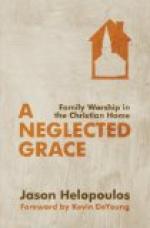The promises of God bear testimony to the influence of the Christian home. “When he grows old he will not depart from it!” History confirms and illustrates this. Look at those scenes of intemperance and riot, of crime and of blood, which throw the mantle of infamy over human life! Look at your prisons, your hospitals, and your gibbets; go to the gaming-table and the rum-shop. Tell me, who are those that are there? What is their history? Where did they come from? From the faithful Christian home? Had they pious fathers and mothers? Did they go to these places under the holy influence of devout and faithful parents? No! And who are they that are dying without hope and without God? Who are they that now throng the regions of the damned? Those who were “trained up in the way they should go?” No! if they are, then the promises of God must fail. You may perhaps find a few such. But these are exceptions to a general law. The damning influence of their unfaithful home brought them there. Could they but speak to us from their chambers of wo, we should hear them pouring out curses upon their parents, and ascribing the cause of their ruin to their neglect. On the other hand, could we but listen to the anthems of the redeemed in heaven, we should doubtless hear sentiments of gratitude for a mother’s prayer and a father’s counsel.
Let us now briefly advert to the objects of home-influence. It is exerted upon the members of home, especially upon the formation of their character and destiny. It moulds their character. The parents assimilate their children to themselves to such an extent that we can judge the former by the latter. Lamartine says that, when he wants to know a woman’s character, he ascertains it by an inspection of her home,—that he judges the daughter by the mother. His judgment rests upon the known influence the latter has over the former. It gives texture and coloring to the whole woof and web of character. It forms the head and the heart, moulds the affections, the will and the conscience, and throws around our entire nature the means and appliances of its development for good or for evil. Every word, every incident, every look, every lesson of home, has its bearing upon our life. Had one of these been omitted, our lives would perhaps be different. One prayer in our childhood, was perhaps the lever that raised us from ruin. One omission of parental duty may result in the destruction of the child. What an influence home exerts upon our faith! Most of our convictions and opinions rest upon home-teaching and faith. A minister was once asked, “Do you not believe christianity upon its evidences?” He replied, “No; I believe it because my mother taught me!”
The same may be said of its influence upon our sympathies, and in the formation of habits. It draws us by magnetic power to home, and develops in us all that which is included in home-feeling and home-sickness.
“I need but pluck yon garden flower,
From where the wild weeds
rise,
To wake with strange and sudden power,
A thousand sympathies!”




